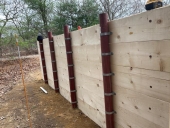
 2
2




Bless your Family,
Mike

 9
9




List of Bryant RedHawk's Epic Soil Series Threads We love visitors, that's why we live in a secluded cabin deep in the woods. "Buzzard's Roost (Asnikiye Heca) Farm." Promoting permaculture to save our planet.
 1
1




Bryant RedHawk wrote:Cooking organic materials is not composting them, the heat will not reduce and that will only allow soil pathogenic ciliates and anaerobic bacteria to thrive, not exactly what one desires in their compost.
If you want to cook your materials to kill the seed bank within those materials, you have found a great way to do that, but to turn those materials into compost you will need to place the containers in a shaded area and moisten them as well as get air into them so bacteria and fungi will be able to populate the "heap" and decompose it.
Bless your Family,
Mike




A human being should be able to change a diaper, plan an invasion, butcher a hog, conn a ship, design a building, write a sonnet, balance accounts, build a wall, set a bone, comfort the dying, take orders, give orders, cooperate, act alone, solve equations, analyze a new problem, pitch manure, program a computer, cook a tasty meal, fight efficiently, die gallantly. Specialization is for insects.
-Robert A. Heinlein












 4
4




Dr. Redhawk, could this stand in for hot composting in terms of the killing of pathogens, and would it return more resources to the soil that are otherwise consumed by the thermophilic bacteria? Could you go from this solar cooking to a cold compost/BSFL/vermiculture staged process and burn through fewer soil resources in the composting?
-CK
List of Bryant RedHawk's Epic Soil Series Threads We love visitors, that's why we live in a secluded cabin deep in the woods. "Buzzard's Roost (Asnikiye Heca) Farm." Promoting permaculture to save our planet.
 1
1




Bless your Family,
Mike
 2
2




Weeds are just plants with enough surplus will to live to withstand normal levels of gardening!--Alexandra Petri




Bless your Family,
Mike




Bless your Family,
Mike

|
Tell me how it all turns out. Here is a tiny ad:
Support permies and give beautiful gifts to gardeners: permaculture playing cards.
https://gardener-gift.com/
|




